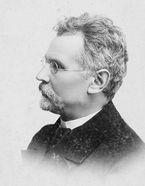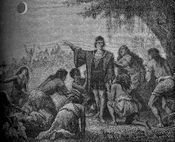فرعون (رواية)
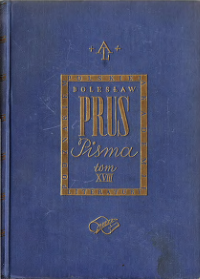 Prus' Works, vol. XVIII, 1935 | |
| المؤلف | Bolesław Prus |
|---|---|
| العنوان الأصلي | Faraon |
| البلد | Poland |
| اللغة | Polish |
| الصنف | رواية تاريخية |
| الناشر | Tygodnik Ilustrowany (Illustrated Weekly); Gebethner i Wolff (book) |
تاريخ النشر | 1895 (Illustrated Weekly), 1897 (book edition) |
| نوع الوسائط | Newspaper, hardback, paperback |
Pharaoh (پولندية: Faraon) is the fourth and last major novel by the Polish writer Bolesław Prus (1847–1912). Composed over a year's time in 1894–95 and published in 1897, it was the sole historical novel by an author who had earlier disapproved of historical novels on the ground that they inevitably distort history.
Pharaoh has been described by Czesław Miłosz as a "novel on... mechanism[s] of state power and, as such, ... probably unique in world literature of the nineteenth century.... Prus, [in] selecting the reign of 'Pharaoh Ramses XIII'[1] in the eleventh century BCE, sought a perspective that was detached from... pressures of [topicality] and censorship. Through his analysis of the dynamics of an ancient Egyptian society, he... suggest[s] an archetype of the struggle for power that goes on within any state."[2]
Pharaoh is set in the Egypt of 1087–85 BCE as that country experiences internal stresses and external threats that will culminate in the fall of its Twentieth Dynasty and New Kingdom. The young protagonist Ramses learns that those who would challenge the powers that be are vulnerable to co-option, seduction, subornation, defamation, intimidation and assassination. Perhaps the chief lesson, belatedly absorbed by Ramses as pharaoh, is the importance, to power, of knowledge.
Prus' vision of the fall of an ancient civilization derives some of its power from the author's intimate awareness of the final demise of the Polish-Lithuanian Commonwealth in 1795, a century before the completion of the novel.
Preparatory to writing Pharaoh, Prus immersed himself in ancient Egyptian history, geography, customs, religion, art and writings. In the course of telling his story of power, personality, and the fates of nations, he produced a compelling literary depiction of life at every level of ancient Egyptian society. Further, he offers a vision of mankind as rich as Shakespeare's, ranging from the sublime to the quotidian, from the tragic to the comic.[3] The book is written in limpid prose and is imbued with poetry, leavened with humor, graced with moments of transcendent beauty.[4]
Pharaoh has been translated into twenty languages and adapted as a 1966 Polish فيلم فرعون. It is also known to have been Joseph Stalin's favourite book.
النشر
الحبكة
رمسيس الـ 13 حارب الليبيين وأخد أسرى كتير كورقة في يده من أجل مفاوضات مقبلة، أو استخدامهم في أعمال البناء والزراعة. وكانت ظروف مصر الاقتصادية سيئة جدا، فاستدان رمسيس عن طريق البدو الذين يعيشون على أطراف سيناء. وطبعا هؤلاء البدو كانوا يعتنقون الديانة اليهودية. حسَّنوا علاقتهم برمسيس، ومنحوه قروض، وأشاروا عليه بأن يعيد الأسرى الليبيين حتى لا يكلفوا الخزينة المصرية الخاوية أصلا، وأن يحارب الكنعانيين. وزوَّجوه واحدة منهم على اعتبار أنها كنعانية وليست يهودية. وبعد ذلك، وبعد أن أنجبت له ولدا، سربوا له أنها ليست كنعانية وأنها أطلقت اسم آخر يستخدم في قبيلتها على الولد. وكان رمسيس يحاول أن يخرج من هذا المأزق، وخاصة بعد أن هددوه تهديدا مبطا بأن موعد سداد القروض قد حان، ويجب التسديد وإلا سيتم تنفيذ الشروط. وفي الوقت نفسه طلبوا منه أن يتركهم ليعيشوا بسلام على الشريط الحدودي لسيناء بدلا من بهدلتهم وتنقلهم في الصحراء. وعندما شعر بالخطر، بدأ يطالب الكهنة بفتح الخزائن وبيع الذهب. وبالتالي، دبت الخلافات بينه وبين الكهنة الذي لم يكن يعرف أحد مخازن الذهب عبر السراديب غيرهم. فراح يؤلب الناس ضدهم، بينما استخدموا هم نفوذهم الديني بين الناس.. وأصبح المشهد كالآتي:
- يجب التنازل عن ورقة الأسرى الليبيين.
- يجب التنازل عن أراض لليهود.
- رمسيس يشعر بالغدر بعد أن خدع في زواجه.
- خزائن البلاد خاوية تماما. - يجب تسديد الديون وإلا سيتم الحجز على أملاك مصر. - حرب أهلية بين أنصار رمسيس وأنصار الكهنة. وانتهى الأمر بمقتل رمسيس الثالث عشر!
الشخصيات
لا يوجد في التاريخ "رمسيس الثالث عشر". آخر الرعامسة كان "رمسيس الحادي عشر". شخصيتا رمسيس 12 و رمسيس 13 هما شخصيتان خياليتان اخترعهما الروائي البولندي بولسواف بروس في روايته "فرعون" الصادرة في 1895.
Accuracy
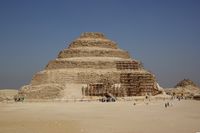
الشعبية
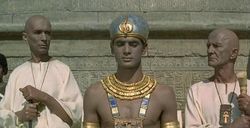
الفيلم
In 1966 Pharaoh was adapted as a Polish feature film directed by Jerzy Kawalerowicz. In 1967 the film was nominated for an Academy Award for Best Foreign-Language Film.
انظر أيضاً
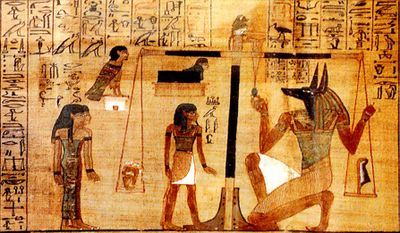
- "A Legend of Old Egypt"
- "Mold of the Earth"
- Assassinations in fiction
- Egypt in the European imagination
- Political fiction
- Politics in fiction
- Utopian and dystopian fiction
- Bildungsroman
- Solar eclipses in fiction
- Spiritualism in fiction
- Labyrinth
- Wieliczka Salt Mine
- Look-alike
- Hypnosis in fiction
- Anatopism
- Anachronism
- Kazimierz Bein
- Jeremiah Curtin
- Pharaoh (the film)
الهامش
- ^ The last pharaoh of Egypt's Twentieth Dynasty and New Kingdom (and Egypt's last Ramesside pharaoh) was actually Ramses XI.
- ^ Czesław Miłosz, The History of Polish Literature, pp. 299–302
- ^ Zygmunt Szweykowski, Twórczość Bolesława Prusa, pp. 345–47.
- ^ Christopher Kasparek, "Prus' Pharaoh: the Creation of a Historical Novel," The Polish Review, 1994, no. 1, p. 49.
مراجع
- Czesław Miłosz, The History of Polish Literature, New York, Macmillan, 1969.
- Christopher Kasparek, "Prus' Pharaoh and Curtin's Translation", The Polish Review, vol. XXXI, nos. 2-3, 1986, pp. 127–35.
- Christopher Kasparek, "Prus' Pharaoh: the Creation of a Historical Novel", The Polish Review, vol. XXXIX, no. 1, 1994, pp. 45–50.
- Christopher Kasparek, "Prus' Pharaoh: Primer on Power", The Polish Review, vol. XL, no. 3, 1995, pp. 331–34.
- Christopher Kasparek, "Prus' Pharaoh and the Wieliczka Salt Mine", The Polish Review, vol. XLII, no. 3, 1997, pp. 349–55.
- Christopher Kasparek, "Prus' Pharaoh and the Solar Eclipse", The Polish Review, vol. XLII, no. 4, 1997, pp. 471–78.
- Christopher Kasparek, "A Futurological Note: Prus on H.G. Wells and the Year 2000," The Polish Review, vol. XLVIII, no. 1, 2003, pp. 89–100.
- Zygmunt Szweykowski, Twórczość Bolesława Prusa (The Art of Bolesław Prus), 2nd edition, Warsaw, Państwowy Instytut Wydawniczy, 1972.
- Zygmunt Szweykowski, Nie tylko o Prusie: szkice (Not Only about Prus: Sketches), Poznań, Wydawnictwo Poznańskie, 1967.
- Krystyna Tokarzówna and Stanisław Fita, Bolesław Prus, 1847-1912: Kalendarz życia i twórczości (Bolesław Prus, 1847-1912: a Calendar of [His] Life and Work), edited by Zygmunt Szweykowski, Warsaw, Państwowy Instytut Wydawniczy, 1969.
- Edward Pieścikowski, Bolesław Prus, 2nd ed., Warsaw, Państwowe Wydawnictwo Naukowe, 1985.
- Stanisław Fita, ed., Wspomnienia o Bolesławie Prusie (Reminiscences about Bolesław Prus), Warsaw, Państwowy Instytut Wydawniczy, 1962.
- Zdzisław Najder, Joseph Conrad: a Life, translated by Halina Najder, Rochester, Camden House, 2007, ISBN 1-57113-347-X.
- Zdzisław Najder, Conrad under Familial Eyes, Cambridge University Press, 1984, ISBN 0-521-25082-X.
- Teresa Tyszkiewicz, Bolesław Prus, Warsaw, Państwowe Zakłady Wydawnictw Szkolnych, 1971.
- Jan Zygmunt Jakubowski, ed., Literatura polska od średniowiecza do pozytywizmu (Polish Literature from the Middle Ages to Positivism), Warsaw, Państwowe Wydawnictwo Naukowe, 1979.
- James Henry Breasted, A History of Egypt from the Earliest Times to the Persian Conquest, New York, Bantam Books, 1967.
- Adolf Erman, ed., The Ancient Egyptians: a Sourcebook of Their Writings, translated [from the German] by Aylward M. Blackman, introduction to the Torchbook edition by William Kelly Simpson, New York, Harper & Row, 1966.
- Herodotus, The Histories, translated and with an introduction by Aubrey de Sélincourt, Harmondsworth, England, Penguin Books, 1965.
- Samuel Eliot Morison, Christopher Columbus, Mariner, Boston, Little, Brown and Company, 1955.
- Bolesław Prus, Pharaoh, translated from the Polish by Christopher Kasparek (2nd, revised ed.), Warsaw, Polestar Publications (ISBN 83-88177-01-X), and New York, Hippocrene Books, 2001.
- The Pharaoh and the Priest: an Historical Novel of Ancient Egypt, from the Original Polish of Alexander Glovatski, by JEREMIAH CURTIN, Translator of "With Fire and Sword," "The Deluge," "Quo Vadis," etc., with Illustrations from Photographs. (An incomplete and incompetent translation, by Jeremiah Curtin, of Prus' novel Pharaoh, published by Little, Brown in 1902.)
